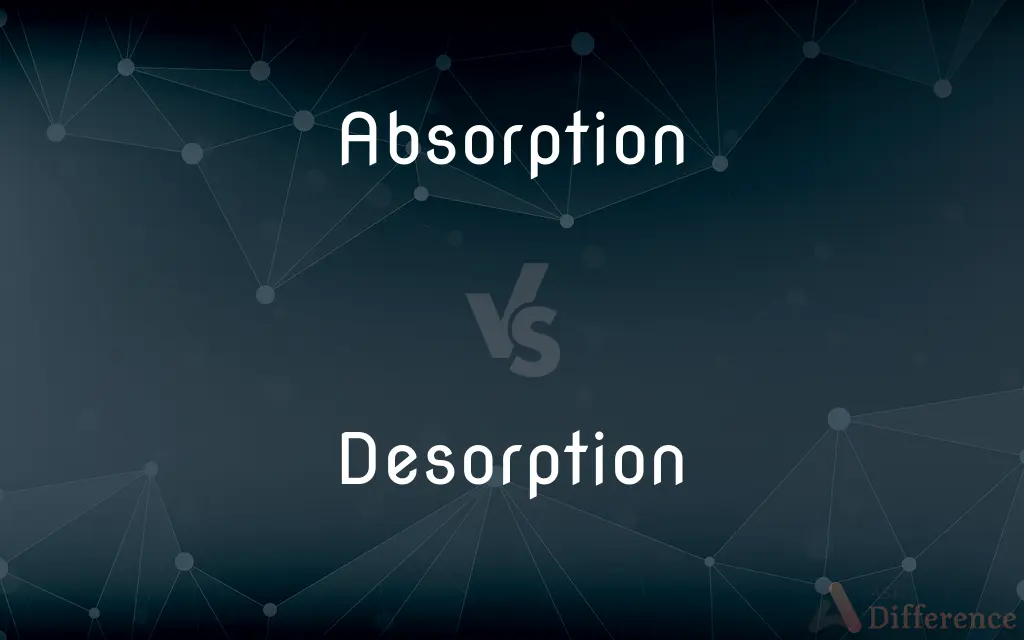Absorption vs. Desorption — What's the Difference?
By Fiza Rafique & Maham Liaqat — Updated on April 6, 2024
Absorption involves a substance being taken up into or across another substance, while desorption releases a substance from or through another substance.

Difference Between Absorption and Desorption
Table of Contents
ADVERTISEMENT
Key Differences
Absorption is the process by which one substance becomes incorporated into another, often involving fluids being absorbed by solids or liquids. This can occur through chemical or physical means, such as water being absorbed by a sponge. On the other hand, desorption is the reverse process, where a substance is released from another, like water vapor leaving a sponge as it dries.
Absorption mechanisms often involve the movement of molecules from a phase of higher concentration to one of lower concentration, following principles of diffusion or osmosis. Whereas desorption mechanisms can be induced by changing conditions such as temperature or pressure, encouraging molecules to move from the solid or liquid phase into the gaseous phase.
In industrial applications, absorption is widely used for processes like gas purification, where harmful gases are absorbed from industrial emissions using solvents. Desorption, conversely, finds its use in regeneration of these absorbing solvents to release the absorbed substances, often through heating or reducing pressure.
Absorption can be highly selective, depending on the nature of the absorbing material and the substance being absorbed. This selectivity is crucial in applications like water purification. Desorption's effectiveness, however, can be influenced by factors such as the binding strength between the absorbed material and the substrate, often requiring specific conditions for efficient release.
While absorption processes can lead to saturation where the absorbent material cannot absorb any more of a substance desorption offers a way to restore the absorbing material’s capacity by removing the absorbed substance, ensuring the sustainability of many industrial processes.
ADVERTISEMENT
Comparison Chart
Definition
Process of taking in a substance by another
Process of releasing a substance from another
Direction of Process
Incorporates substances into or across a medium
Releases substances from or through a medium
Mechanisms
Diffusion, osmosis, chemical bonding
Heating, reducing pressure, chemical change
Applications
Gas purification, drug delivery
Solvent regeneration, material drying
Selectivity
Can be highly selective
Influenced by binding strength
Compare with Definitions
Absorption
Absorption refers to the process where a material takes up another substance through physical or chemical means.
A towel absorbs water due to its porous structure.
Desorption
In materials science, desorption is used to clean surfaces by removing adsorbed substances.
Desorption techniques are essential for semiconductor manufacturing.
Absorption
In biology, absorption is the assimilation of substances into cells or across tissues.
Nutrients are absorbed through the walls of the intestine.
Desorption
Desorption denotes the process by which a substance is released from or through a surface.
Heating a wet sponge causes water desorption into the air.
Absorption
In chemistry, absorption can involve gases or liquids being taken up by solids or other liquids.
Activated carbon absorbs gases and impurities from water.
Desorption
In environmental science, desorption refers to the release of pollutants from sediments into water.
Toxic chemicals desorb from riverbeds into the water column.
Absorption
In optics, absorption is the attenuation of light as it passes through a medium.
Dark glass absorbs more light than clear glass.
Desorption
In analytical chemistry, desorption allows the analysis of substances absorbed on a solid phase.
Thermal desorption is used to release chemicals for gas chromatography analysis.
Absorption
In acoustics, absorption refers to the dampening of sound waves by a material.
Acoustic panels in a studio absorb sound to reduce echo.
Desorption
In vacuum technology, desorption is critical for maintaining low pressures by removing gas molecules.
Outgassing involves desorption processes to clean vacuum chambers.
Absorption
The act or process of absorbing or the condition of being absorbed.
Desorption
Desorption is a phenomenon whereby a substance is released from or through a surface. The process is the opposite of sorption (that is, either adsorption or absorption).
Absorption
A state of mental concentration.
Desorption
The release of an adsorbed substance from a surface
Cholesterol desorption from cell membranes
Absorption
The act or process of absorbing or of being absorbed as,
Desorption
To release (something) through pores or interstices.
Absorption
(obsolete) engulfing; swallowing up, as of bodies or land.
Desorption
To remove (an absorbed or adsorbed substance) from.
Absorption
Assimilation; incorporation.
The absorption of a smaller tribe into a larger
The absorption of bodies in a whirlpool
Desorption
The process in which atomic or molecular species leave the surface of a solid and escape into the surroundings; the reverse of absorption or adsorption.
Absorption
The imbibing or reception by molecular or chemical action, of radiant energy; the process of being neutrons being absorbed by the nucleus; interception.
The absorption of light, heat, electricity, etc.
Desorption
Changing from an adsorbed state on a surface to a gaseous or liquid state
Absorption
(meteorology) The process in which incident radiant energy is retained by a substance (such as an air mass) by conversion to some other form of energy (such as heat).
Absorption
(physiology) in living organisms, the process by which the materials of growth and nutrition are absorbed and conveyed to the tissues and organs; taking in by various means, such as by osmosis.
Absorption
Entire engrossment or occupation of the mind.
Absorption in some employment
Absorption
Mental assimilation.
Absorption
(electrical engineering) The retaining of electrical energy for a short time after it has been introduced to the dielectric.
Absorption
The act or process of absorbing or sucking in anything, or of being absorbed and made to disappear; as, the absorption of bodies in a whirlpool, the absorption of a smaller tribe into a larger.
Absorption
An imbibing or reception by molecular or chemical action; as, the absorption of light, heat, electricity, etc.
Absorption
In living organisms, the process by which the materials of growth and nutrition are absorbed and conveyed to the tissues and organs.
Absorption
Entire engrossment or occupation of the mind; as, absorption in some employment.
Absorption
(chemistry) a process in which one substance permeates another; a fluid permeates or is dissolved by a liquid or solid
Absorption
(physics) the process in which incident radiated energy is retained without reflection or transmission on passing through a medium;
The absorption of photons by atoms or molecules
Absorption
The social process of absorbing one cultural group into harmony with another
Absorption
The process of absorbing nutrients into the body after digestion
Absorption
Complete attention; intense mental effort
Absorption
The mental state of being preoccupied by something
Common Curiosities
Where is desorption commonly used?
Desorption is used in solvent regeneration, drying processes, and pollution control.
What is absorption?
Absorption is the process by which one substance is taken up by another, such as a sponge absorbing water.
What is desorption?
Desorption is the release of a substance from where it has been absorbed, like when water vapor leaves a drying sponge.
How do absorption and desorption differ?
Absorption is the process of taking substances in, while desorption involves releasing those substances.
Is saturation a concern in absorption processes?
Yes, saturation can occur when the absorbent material can no longer take up more of a substance.
What factors affect desorption?
Factors include the binding strength between substances and conditions such as temperature.
What induces desorption?
Desorption can be induced by heating, reducing pressure, or chemical changes.
Why is selectivity important in absorption?
Selectivity is crucial for applications requiring specific substances to be absorbed.
How does desorption contribute to sustainability?
Desorption enables the recycling and regeneration of materials, contributing to sustainable processes.
What are common applications of absorption?
Applications include gas purification, water treatment, and drug delivery systems.
How can desorption restore the capacity of an absorbent material?
By removing the absorbed substance, desorption can restore the material’s absorbing capacity.
What mechanisms are involved in absorption?
Mechanisms include diffusion, osmosis, and chemical bonding.
Can absorption be selective?
Yes, absorption can be highly selective depending on the materials and conditions involved.
Can desorption be used for analysis?
Yes, desorption techniques are used to analyze substances in various scientific fields.
What role does absorption play in environmental science?
It plays a key role in processes like water purification and air pollution control.
Share Your Discovery

Previous Comparison
Bash vs. Party
Next Comparison
Kafka vs. KinesisAuthor Spotlight
Written by
Fiza RafiqueFiza Rafique is a skilled content writer at AskDifference.com, where she meticulously refines and enhances written pieces. Drawing from her vast editorial expertise, Fiza ensures clarity, accuracy, and precision in every article. Passionate about language, she continually seeks to elevate the quality of content for readers worldwide.
Co-written by
Maham Liaqat














































